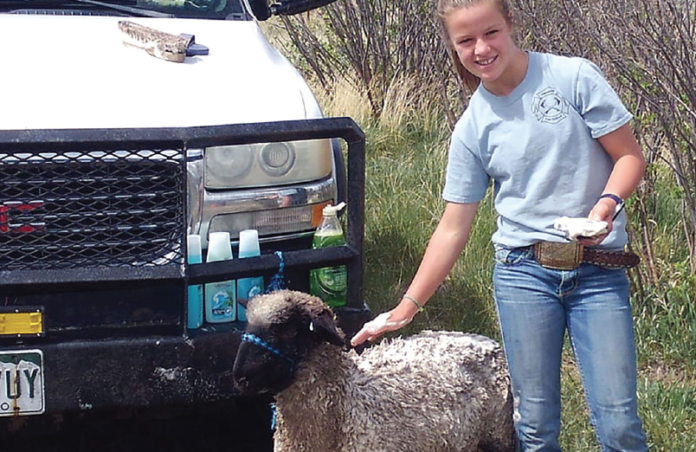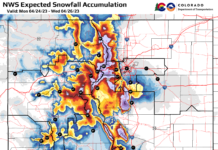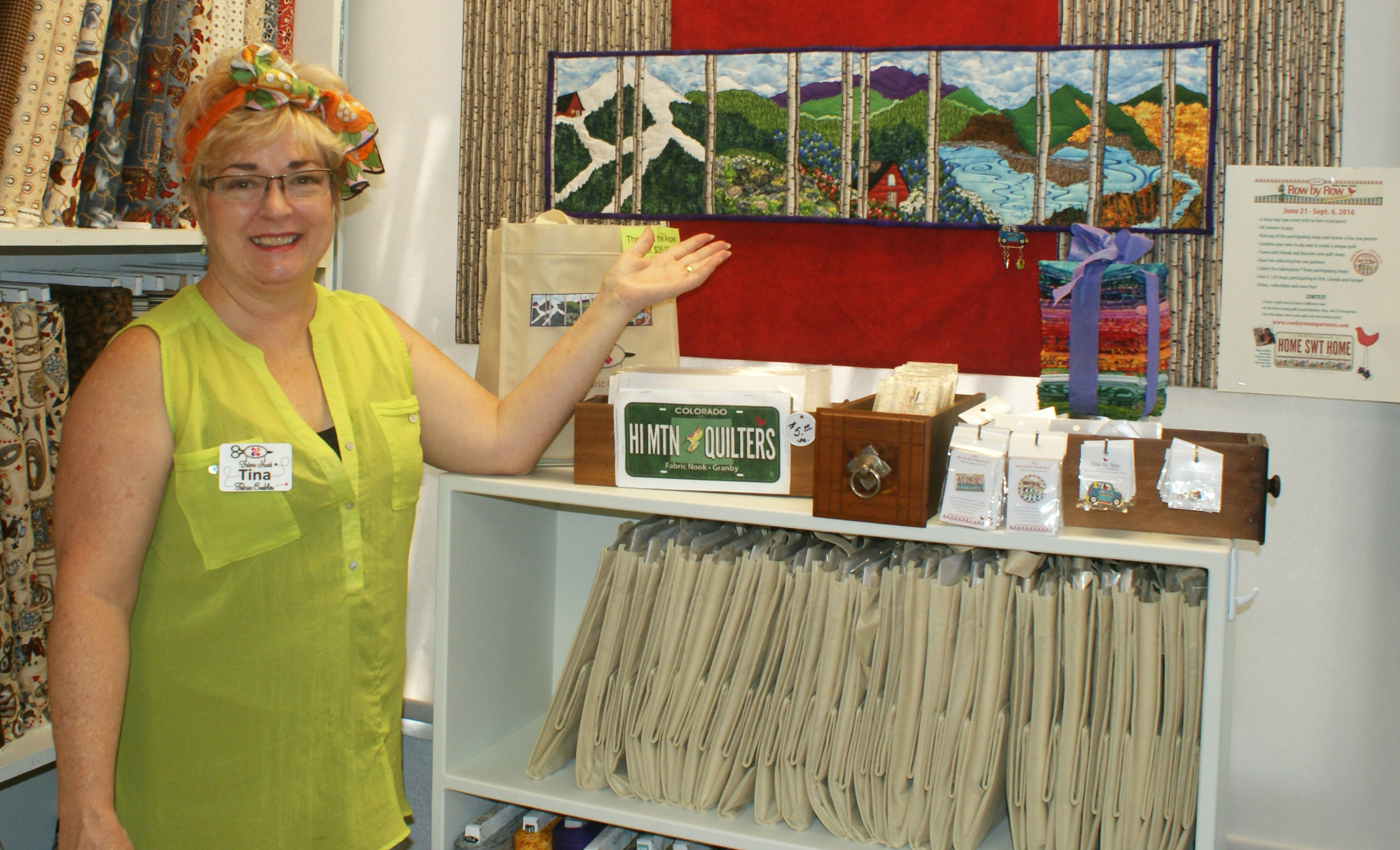
by Kim Cameron
The recent decision of the Middle Park Fair & Rodeo board to continue the 4-H livestock shows in August was a relief to many Middle Park 4-H members who have already invested time and money into their 4-H projects.
A parent of 4-Hers and Grand County Assistant Manager Ed Moyers says of the decision, “Our community, and especially our youth, have
gone through a lot this spring. The 4-H youth deserve the opportunity to continue working on their 4-H projects and showcase their hard work the first week of August. 4-H is such an important program for so many of our youth, and is an important piece of our community fabric. Our youth learn so many lifelong skills through 4-H and we cannot take that away from them this year.”
Dalene Harthun, whose daughters Taylin, 13, and Tally, 11, began their market steer project in October of 2019, emotionally explains, “My girls have been working really hard every day. Their steers are part of their daily life.” The girls exercise, feed and groom their steers morning and night.
For many 4-H families, generations of family members have participated at the Middle Park Fair & Rodeo for years and the Harthuns are no exception. In fact, while many families may focus on school sports throughout the year, the Harthuns’ focus is on their animals. The family barrel races, rodeos and works on their market steer projects year round.
This commitment and hard work has rewarded the girls with Grand Champion and Reserve Champion market steers and a plethora of paychecks and belt buckles in the rodeo arena.
Tim Wall, also a 4-H alumni, was relieved the MPFR board voted to continue the livestock show. His daughter, Kenna, 11, will show pigs, steers, sheep and goat. Kenna’s goal this year was to exhibit locally-raised livestock as much as she could, and all but her pig project were born in the Kremmling area. She raised her own goat from a doe she kept from last year’s 4-H project, and she purchased her steers from her grandma and another local rancher, Jay Yust. Her lamb, she purchased from fellow 4-Her, Trace Lewis.
Of the hardships the livestock show and sales face this year, Tim comments, “We are an ag community. A little more hard work will be required, but it can be done.”
Randy Lewis, who has served as the Junior Livestock Auctioneer for nearly 20 years, agrees the show and sale must go on. He suggests a hybrid model for this year’s sale. He believes combining a virtual auction and a live auction could open up possibilities for potential buyers across the county to bid and participate in the sale from wherever they are.
“We may not have the economy to sustain this year’s sale in Kremmling.
This opens up the door for people to be able to bid and may help maintain the status quo,” explains Randy.
The livestock auction helps to offset costs for 4-Hers and makes their projects profitable. Buyers tend to pay above market price in support of these young entrepreneurs.
“We need to make sure the kids are taken care of,” Randy continues.
“Without these kids moving forward – we are in trouble in the agriculture world. We need to all work together to make this happen.”
The sale committee is exploring its options and analyzing costs because virtual sales do not come cheaply. Fortunately, the fairboard has committed $6,000 to the Junior Livestock Sale to help defray the costs.
“The current plan is to have both a virtual auction and a live auction,” says Mari Miller, president of the sale committee.
She explains the sale committee chose DVAuctions for this year’s virtual sale. It was founded in 1999 and specializes in real-time internet broadcasting of sales. Mari states, “Photos will be posted for a live auction event after each of the species show, and there will be a live video feed for the auction on Saturday.”
The 4-H livestock sale committee will now be busy marketing the virtual sale to attract possible buyers across the county. The sale allows for 100 lots, but Mari hopes this may also help 4-Hers market their additional animals as well. “We are trying to make the best 4-H sale for 2020 that we can.”
Ultimately, she stresses the decision for the live auction relies on the Governor’s orders, and the live auction could be cancelled, but no matter what, the virtual sale will happen. However, she hopes the camaraderie and fun of the live auction can continue this year; many returning buyers look forward to supporting young 4-H members
and meeting them in person. Mari has seen this first-hand from her experiences as a 4-H member, her years as a 4-H parent and 4-H leader, and in her role as the sheep/goat superintendent.
Agriculture was deemed an essential business when the pandemic began, but 4-H livestock shows are governed by Colorado State University, the Governor’s orders, and the county government. And since CSU provides the majority of judges for livestock projects, it adds a layer of difficulty to hosting a livestock show.
Fairboard President and former 4-H member, Dakota Docheff-Cordle, who has advocated for continuing the fair and its summer activities, is actively working with the County to approve a plan to keep the show going.
She states, “The CSU Extension, Livestock Sale Committee, and MPFR Fairboard are collaborating to draft a plan in hopes of continuing the livestock sale and livestock shows. Updates to come as state orders change and plans are submitted.”
Hopefully, the traditional livestock show will continue with few variations. The MPFR board is submitting a plan that includes how the 4-H show could be run. It would limit the number of showmen in the ring and keep them six feet apart. It would also limit the people around the showring and the number of people permitted in the barn.
And of course, there will be ample supplies of hand sanitizer. The logistics of the live 4-H auction are still being determined with the MPFR board looking at moving the location to the beef showring, internet options and more.
“The county’s backing of the fair is key. With their support and knowledge, it can be done. I love the County being involved as much as they are and trust they will help us have as much of a normal fair as we can,” Tim Wall concluded, “The Commissioners have really stepped up!”
Assistant Manager Moyer agrees, “I must applaud the Middle Park Fair & Rodeo Board, Sale Committee, Barn Superintendents, CSU Extension staff, Fairgrounds Manager, and the many volunteers that are doing their very best to implement plans, in accordance with the ever changing state orders, to accomplish a goal of allowing our youth to participate in 4-H activities, complete 4-H projects, and show and sell their livestock. They deserve a big elbow bump!”
He continues, “There no doubt will be modifications to ‘normal’ with regard to exhibits, shows and a sale. We have very dedicated individuals that are working hard on creative plans to adapt to the applicable State orders. Please contact the Fair Board, Sale Committee or CSU Extension staff the first week of July for more details.”
The Middle Park Fair & Rodeo is scheduled for July 31-August 9 and the details are being finalized. The Livestock Junior Sale is slated for Saturday afternoon on August 8 in the beef showring. For updated scheduling information, visit www. middleparkfairandrodeo.com.








